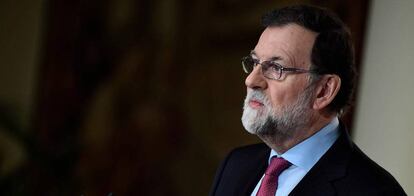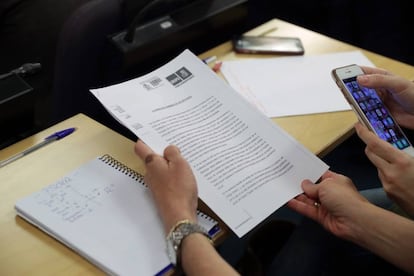Rajoy accuses Socialists of weakening Spain with no-confidence motion
PM rules out calling early elections, and says the motion seeks to advance partisan agendas, not the interests of Spain

Spanish Prime Minister Mariano Rajoy made a televised statement to the press at 2pm on Friday, in response to the no-confidence motion filed against him by the main opposition Socialist Party (PSOE).
The move by party leader Pedro Sánchez came in the wake of a ruling in the wide-ranging Gürtel corruption trial, in which the court fined the PP for benefiting from the scheme, which ran between 1999 and 2006, and sentenced a former treasurer to 33 years in prison. The judgment also found solid evidence of the existence of a party slush fund.
The goal for Sánchez now is to be the prime minister at any cost, and with support from anyone
PM Mariano Rajoy
On Friday, the prime minister ruled out calling early elections. Rajoy told Ciudadanos leader Albert Rivera, who wants a fresh ballot as soon as possible, that he plans to serve out his full term until 2020. Ciudadanos is currently heading voting intention polls.
Rajoy added that the no-confidence vote would “damage the economy” and called it a “bad motion for Spaniards, and damaging for all Spaniards, and all just in the interest of Mr Sánchez.”
“Mr Sánchez lost the elections in 2015 and 2016, and brought his party down to 84 seats, the PSOE’s lowest figure since elections were first held in our country,” said Rajoy. “The goal now is for him to be the prime minister at any cost, and with support from anyone. Sánchez has two options: reaching a deal with Ciudadanos and Podemos at the same time, or with ERC, the PDeCAT of Mr Puigdemont and Mr Torra, with Bildu and with Compromis.”

Rajoy was referring to Sánchez’s call for backing from all parties in Congress, including those who are in favor of Catalan independence, such as ousted leader Carles Puigdemont’s PDeCAT and the Catalan Republican Left (ERC), or the radical Basque party Bildu. “Running a government with this kind of support is not viable and he knows it,” Rajoy stated. “But he does not care.”
The motion, said Rajoy, “comes after the approval of a budget that, without a doubt, provided political stability and in a difficult situation for Spain given that we are applying Article 155 [of the Spanish Constitution] in Catalonia.” Rajoy was referring to the suspension of autonomous powers in the northeastern region in the wake of last year’s unilateral declaration of independence passed through the Catalan parliament. “As such,” he continued, “the motion goes against the stability of Spain.”
Moving on to the Gürtel case, Rajoy said that the ruling was going to be appealed, and noted that “no member of the government that [Sánchez] is subjecting to a no-confidence vote has been convicted of any crime.”
He added: “What [the ruling] establishes is a civil responsibility of the PP and not a criminal one, because the party was not aware of the facts, as the ruling itself states.”
Queried by reporters about the fact that the Gürtel judgment questioned the credibility of statements Rajoy himself gave the court last year as a witness in the trial, Rajoy responded: “But who hands out certificates of credibility in Spain? The citizens. Who has more credibility than them?” he asked, before pointing out that his party currently enjoys 134 seats in Congress, compared to the 84 of the PSOE.
“This government has some credibility, because it found a Spain on the edge of collapse and we have now been growing above 3% for three years,” he added. “Both the no-confidence vote and the call for early elections have to do with partisan interests,” he said. “The general interest calls for the political term to run its course.”
It also emerged on Thursday afternoon that Rajoy had canceled his planned trip to Kiev tomorrow to watch Real Madrid play Liverpool in the Champions League final.
English version by Simon Hunter and Susana Urra..
Tu suscripción se está usando en otro dispositivo
¿Quieres añadir otro usuario a tu suscripción?
Si continúas leyendo en este dispositivo, no se podrá leer en el otro.
FlechaTu suscripción se está usando en otro dispositivo y solo puedes acceder a EL PAÍS desde un dispositivo a la vez.
Si quieres compartir tu cuenta, cambia tu suscripción a la modalidad Premium, así podrás añadir otro usuario. Cada uno accederá con su propia cuenta de email, lo que os permitirá personalizar vuestra experiencia en EL PAÍS.
¿Tienes una suscripción de empresa? Accede aquí para contratar más cuentas.
En el caso de no saber quién está usando tu cuenta, te recomendamos cambiar tu contraseña aquí.
Si decides continuar compartiendo tu cuenta, este mensaje se mostrará en tu dispositivo y en el de la otra persona que está usando tu cuenta de forma indefinida, afectando a tu experiencia de lectura. Puedes consultar aquí los términos y condiciones de la suscripción digital.








































